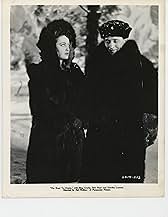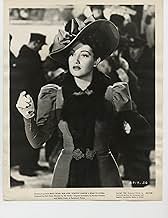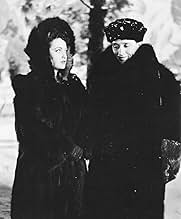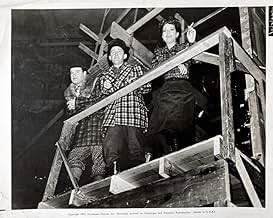ÉVALUATION IMDb
7,1/10
3,9 k
MA NOTE
Ajouter une intrigue dans votre langueTwo vaudeville flops pose as bad guys and join the Klondike gold rush with a saloon singer.Two vaudeville flops pose as bad guys and join the Klondike gold rush with a saloon singer.Two vaudeville flops pose as bad guys and join the Klondike gold rush with a saloon singer.
- Nommé pour 1 oscar
- 3 victoires et 1 nomination au total
Jack La Rue
- LeBec
- (as Jack LaRue)
George Anderson
- Townsman
- (uncredited)
Stanley Andrews
- Joe - Official at Ship
- (uncredited)
Bobby Barber
- Bartender
- (uncredited)
William 'Billy' Benedict
- Second Newsboy
- (uncredited)
Carmella Bergstrom
- Woman
- (uncredited)
Billy Bletcher
- Bear
- (voice)
- (uncredited)
Phil Bloom
- Show Spectator
- (uncredited)
Eddie Borden
- Man in Saloon
- (uncredited)
Rudy Bowman
- Show Spectator
- (uncredited)
Avis en vedette
This is hardly an original insight, but anyone who dismisses Bob Hope as the tiresome, unfunny comic from those dreadful '60s 'comedies' he appeared in is missing out on a real national treasure - his films up to around 1952 are hysterically funny, and his ROAD entries with cohorts Crosby and Lamour are among the best of 'em. Hope, along with the brilliant Preston Sturges, had restored Paramount to the comedy throne they'd occupied in the early 30s; from the lavish budget and attention to period detail throughout UTOPIA, it's obvious that the studio was not ungrateful. For my money, ROAD TO UTOPIA is the funniest film he ever made (though there are half-a-dozen others close on its heels). As in all ROAD movies, the engine powering the vehicle was the lightning-quick banter between the two leads; Crosby smooth as snake-oil , Hope perpetually suspicious and cowardly. And with excellent reason, as no straight man ever victimized a foil the way Bing routinely does to Bob. ROAD movies always threaded their satires of B-movie plots (this one spoofing Robert W Service-style frozen-North melodrama) with plenty of topical humor, much of it capitalizing on the fans' awareness of the stars' personal foibles (Crosby's rivalry with Sinatra, his investments in thoroughbreds, Hope's disastrous box-office returns in LET'S FACE IT), and there's a goodly amount of what later generations referred to as 'breaking the fourth wall' ( they talk directly to the audience at varying points). What elevates UTOPIA over the others is the sky-high breezy confidence of everyone involved this go-around. The cast and crew, coming off ROAD TO MOROCCO, were on a roll and knew it and they ride that momentum for all it's worth, Hope's constant kibitzing particularly hilarious from start to finish. Der Bingle gets to groan a couple of subpar songs (as opposed to MOROCCO's highlights - 'Ho Hum' and 'Moonlight Becomes You' - this outing's 'It's Anybody's Spring' and 'Welcome To My Dream' are instantly forgettable) but the team's 'Put It There, Pal' is infectious fun and Miss Lamour's 'Personality' is sexy and sprightly. A further note on Lamour - she's luxuriously beautiful here, an ice-cream sundae with curves (why she's never ranked with the decade's top screen sirens is unfathomable: she's every bit the looker that Lake, Grable, Hayworth & Sheridan were, and a better singer besides). My apologies for not quoting any of the zingers from the script, but there are just too many of them to play favorites with. ROAD TO UTOPIA is well worth the effort it'll take you to track down; get cracking.
If you need some laughs, this is a movie for you. I think this is the fourth of the "Road" pictures that Hope and Crosby made together. "The Road to Rio" was good, too, but the ones that followed demonstrated a flagging of inspiration.
Here, they are the crew are at their best. The plot is screwball, as usual, and not worth spelling out. What counts are the songs, the gags, and the interplay between the three principals -- Hope, Crosby, and Dorothy Lamour.
Most of the Road pictures had one or two songs which wound up on the pop charts. They were usually kind of pretty and unpretentious, "easy listening", to coin a phrase. (Oh, bring it back, sob!) "Moonlight Becomes You," "Personality," "Welcome to My World." And Bing did most of the singing in his smooth baritone. Nothing more than proficient and pleasant to listen to, although he belonged to, I think, a peppy vocal trio in the early 1930s whose arrangements were kind of original.
The gags were usually amusing, sometimes laugh-out-loud funny. There was, inevitably the occasional clunker but everything was so good natured that they are easily forgiven. The script was by Panama and Frank, but many of the jokes were improvised on the set by the actors. Hope also brought in some gags from his platoon of writers (he was a famous radio comedian at the time), giving some of them to Crosby and Lamour as well. There was a good deal of playing with the fourth wall and a lot of in jokes too. Some of these may be lost on modern viewers. Eg., Hope is driving Crosby along on a dog sled, and he raises his arms and says, "Look Ma, no hands." "Look Ma, no teeth," remarks Crosby. "Please," says Hope, "my sponsor." His radio sponsor was Pepsodent Toothpaste.
The three principal actors play off each other well. Dorothy Lamour was an unpretentious actress of modest talents who never pretended to be anything else, although she provided a very nice frame to hang a sarong on. What I like most about the relationship between Hope and Crosby is the measured equality of their stupidity and greed. Hope wasn't really subordinate to Crosby. Everything Hope said and did was within the realm of human reality. He didn't have the flapping run or squeaky voice of Jerry Lewis. He didn't get slapped around like Lou Costello. He wasn't intellectually challenged. And Crosby was much more of a participant in the goings on than a straight man would be. He's hardly less gullible than Hope, and equally cowardly. When they're about to be boiled by cannibals or hanged by vigilantes, they trade wisecracks with one another. Crosby is the promoter and Hope is the stooge, but neither is superior to the others.
This really is a relaxing ride. I spent a summer doing a sociological study of Scagway. The set gives a surprisingly good suggestion of what it still looks like. It's a dramatic place overlooked by a proud glacier the color of blue glass. And the kind of Wild West atmosphere the movie evokes isn't entirely fictional. People had names like "Soapy Smith".
Here, they are the crew are at their best. The plot is screwball, as usual, and not worth spelling out. What counts are the songs, the gags, and the interplay between the three principals -- Hope, Crosby, and Dorothy Lamour.
Most of the Road pictures had one or two songs which wound up on the pop charts. They were usually kind of pretty and unpretentious, "easy listening", to coin a phrase. (Oh, bring it back, sob!) "Moonlight Becomes You," "Personality," "Welcome to My World." And Bing did most of the singing in his smooth baritone. Nothing more than proficient and pleasant to listen to, although he belonged to, I think, a peppy vocal trio in the early 1930s whose arrangements were kind of original.
The gags were usually amusing, sometimes laugh-out-loud funny. There was, inevitably the occasional clunker but everything was so good natured that they are easily forgiven. The script was by Panama and Frank, but many of the jokes were improvised on the set by the actors. Hope also brought in some gags from his platoon of writers (he was a famous radio comedian at the time), giving some of them to Crosby and Lamour as well. There was a good deal of playing with the fourth wall and a lot of in jokes too. Some of these may be lost on modern viewers. Eg., Hope is driving Crosby along on a dog sled, and he raises his arms and says, "Look Ma, no hands." "Look Ma, no teeth," remarks Crosby. "Please," says Hope, "my sponsor." His radio sponsor was Pepsodent Toothpaste.
The three principal actors play off each other well. Dorothy Lamour was an unpretentious actress of modest talents who never pretended to be anything else, although she provided a very nice frame to hang a sarong on. What I like most about the relationship between Hope and Crosby is the measured equality of their stupidity and greed. Hope wasn't really subordinate to Crosby. Everything Hope said and did was within the realm of human reality. He didn't have the flapping run or squeaky voice of Jerry Lewis. He didn't get slapped around like Lou Costello. He wasn't intellectually challenged. And Crosby was much more of a participant in the goings on than a straight man would be. He's hardly less gullible than Hope, and equally cowardly. When they're about to be boiled by cannibals or hanged by vigilantes, they trade wisecracks with one another. Crosby is the promoter and Hope is the stooge, but neither is superior to the others.
This really is a relaxing ride. I spent a summer doing a sociological study of Scagway. The set gives a surprisingly good suggestion of what it still looks like. It's a dramatic place overlooked by a proud glacier the color of blue glass. And the kind of Wild West atmosphere the movie evokes isn't entirely fictional. People had names like "Soapy Smith".
At the turn of the century two vaudeville performers Chester (Bob Hope) and Duke (Bing Crosby) go to Alaska to make their fortune.On the way they run in all kind of weird and funny stuff, like talking animals. Road to Utopia from 1946 is one of the 'Road' films with Hope and Crosby and it's very good.These two worked really good together.Bing Crosby (1903-1977) does a very fine job in the lead.Bob Hope was a very funny man.This great comedian passed away last July of pneumonia.He had turned a hundred years last May.He had a great life and a great career and all the fans of Bob will miss him very much.He was one of the kind. Dorothy Lamour (1914-1996) is brilliant as Sal van Hoyden.This movie is filled with great gags.I recommend it to all comedy lovers out there.
Oh this one is funny...haven't seen it since High school, years and years ago, but I remember it well...the seen where an aged couple-including Hope, talk about their son-and then in comes Bing Crosby(!!)-where Hope sez to the camera-'We adopted him!'...oh what a riot. And then there is the great scene where they are sledding, and the Paramount stars pop up over a mtn in the background...the constant lines about how, even when they're in trouble, 'Paramount won't let anything happen to us because we're under contract for another 4 pictures' or words to that effect...very funny stuff, Benchley's narration a hoot too.
***, this one is funny and to my thinking the best of the lot.
***, this one is funny and to my thinking the best of the lot.
Duke Johnson (Bing Crosby) and Chester Hooton (Bob Hope) are struggling entertainers down on their luck who travel to Alaska. Killers Sperry and McGurk steal a vital map showing the location of a gold mine. Our two heroes manage to obtain the map and decide to impersonate Sperry and McGurk which leads them into more trouble than they could ever have imagined. Along the way they meet saloon singer Sal Van Hoyden (Dorothy Lamour) and as usual both men compete for her charms. With Sperry and McGurk hot on their trail plus other assorted villains after them Hope and Crosby get into many tight corners but they still find time for some catchy songs along the way including "Put It There Pal" which is a typical Hope/Crosby kind of number and Dorothy Lamour puts over "Personality" with her usual flair.
Of all seven of the "Road" pictures there are four which to me are outstanding and superior to any other comedy films from that same period. The "Road" films have certainly stood the test of time over the years and not become dated. My four favourites are the Roads to "Morocco", "Utopia", "Rio" and "Bali". Hope and Crosby worked well together as a team and in "Road to Utopia" reached new comedy heights. The film is very fast moving with gag following gag, talking animals, many hilarious comedy routines and situations, and even has Robert Benchley occasionally interrupting the proceedings to give an entertaining commentary on the film. The film is told in "flashback" and has a brilliant pay-off line at the end (one of the best in the entire "Road" series).
Some favourite lines from the film:
Bob Hope (to Bing Crosby): "I didn't think there was one more way to get the cops after us but you found it!".
Hope (to Crosby): "Next time I'll bring Sinatra!". (When Crosby loses a talent contest on board ship).
Hope (to Crosby): "It may be a mountain to you but it's bread and butter to me".
Hope (to Douglass Dumbrille): "I'll take a lemonade .... in a dirty glass!".
Hope (to audience): "We adopted him!".
The "Road" films never won any Oscars but brought an enormous amount of pleasure to a lot of people during the 40's. Hope and Crosby were a great team and made seven "Road" films in total. They both had very successful careers separately in movies, television, radio and on the stage and were probably two of the biggest stars to come out of Hollywood in the thirties and forties. 10/10. Clive Roberts.
Of all seven of the "Road" pictures there are four which to me are outstanding and superior to any other comedy films from that same period. The "Road" films have certainly stood the test of time over the years and not become dated. My four favourites are the Roads to "Morocco", "Utopia", "Rio" and "Bali". Hope and Crosby worked well together as a team and in "Road to Utopia" reached new comedy heights. The film is very fast moving with gag following gag, talking animals, many hilarious comedy routines and situations, and even has Robert Benchley occasionally interrupting the proceedings to give an entertaining commentary on the film. The film is told in "flashback" and has a brilliant pay-off line at the end (one of the best in the entire "Road" series).
Some favourite lines from the film:
Bob Hope (to Bing Crosby): "I didn't think there was one more way to get the cops after us but you found it!".
Hope (to Crosby): "Next time I'll bring Sinatra!". (When Crosby loses a talent contest on board ship).
Hope (to Crosby): "It may be a mountain to you but it's bread and butter to me".
Hope (to Douglass Dumbrille): "I'll take a lemonade .... in a dirty glass!".
Hope (to audience): "We adopted him!".
The "Road" films never won any Oscars but brought an enormous amount of pleasure to a lot of people during the 40's. Hope and Crosby were a great team and made seven "Road" films in total. They both had very successful careers separately in movies, television, radio and on the stage and were probably two of the biggest stars to come out of Hollywood in the thirties and forties. 10/10. Clive Roberts.
Le saviez-vous
- AnecdotesBob Hope recalled that during the scene where he and Bing Crosby were bedding down beside their cabin in the Klondike, they were to be joined by a bear. They were told that the bear was tame and its trainer would always be nearby. Against their better judgment they went along with it. However, when the cameras started filming, the bear ambled over to Hope and, instead of lying down next to him like it was supposed to, the animal sniffed him and started growling. Hope and Crosby immediately stopped the scene and refused to work with the bear any longer, despite the trainer's protestations that it was tame and harmless. The next day the bear attacked its trainer and tore his arm off.
- GaffesThe right arm of the person holding the talking fish is visible.
- Citations
[Duke loses a talent show to a trained monkey]
Chester Hooton: [to Duke] Next time I bring Sinatra.
- Générique farfeluNarrator Robert Benchley credits himself orally in a precredit sequence.
- ConnexionsFeatured in Paramount Presents (1974)
- Bandes originalesPut It There, Pal
(1946)
Music by Jimmy Van Heusen
Lyrics by Johnny Burke
Played during the opening credits and also as background music
Performed later by Bing Crosby and Bob Hope
Meilleurs choix
Connectez-vous pour évaluer et surveiller les recommandations personnalisées
- How long is Road to Utopia?Propulsé par Alexa
Détails
- Durée1 heure 30 minutes
- Couleur
- Rapport de forme
- 1.37 : 1
Contribuer à cette page
Suggérer une modification ou ajouter du contenu manquant

Lacune principale
By what name was Road to Utopia (1945) officially released in India in English?
Répondre
![Regarder Trailer [EN]](https://m.media-amazon.com/images/M/MV5BNWRiMzM4OTktNDlkMS00YWJiLWEwNDMtZTY0ZjAwMzY3YjM2XkEyXkFqcGdeQXRyYW5zY29kZS13b3JrZmxvdw@@._V1_QL75_UX500_CR0)


































